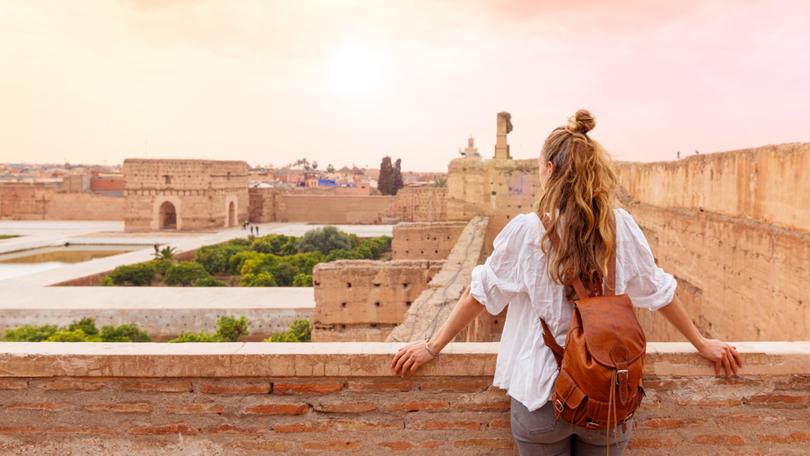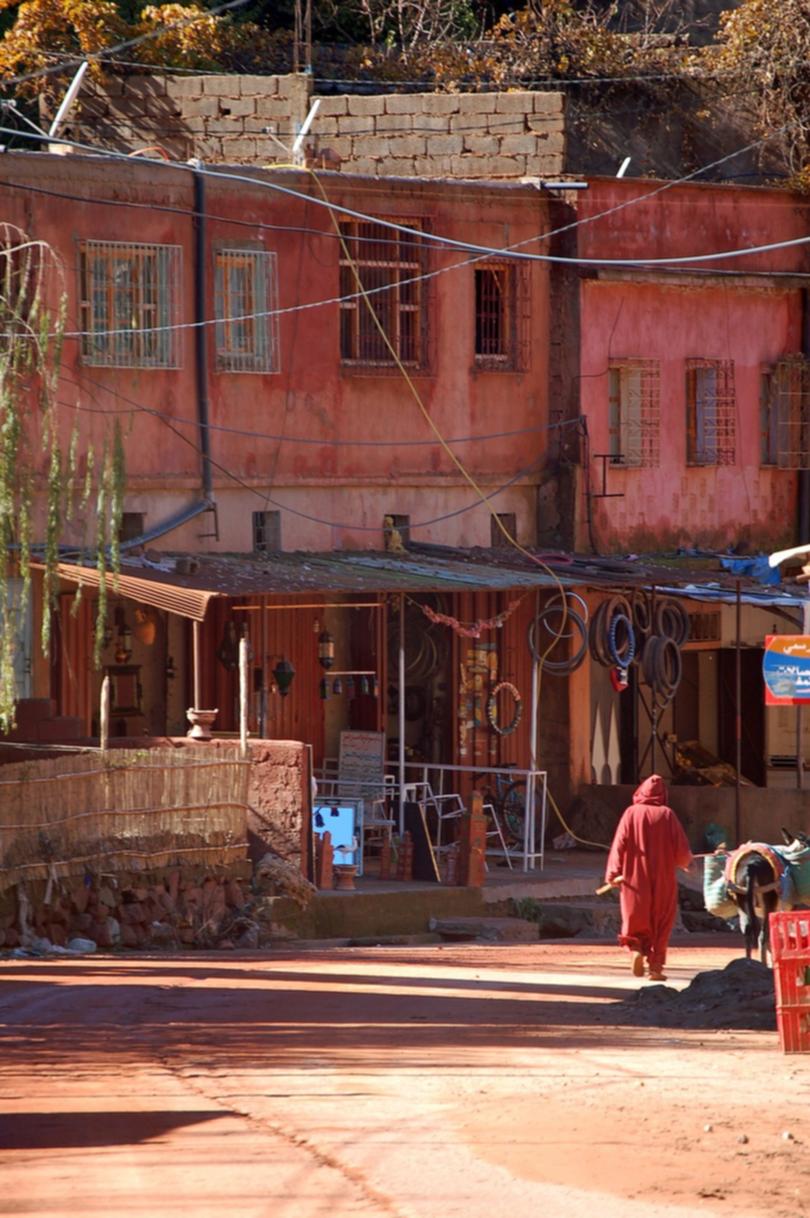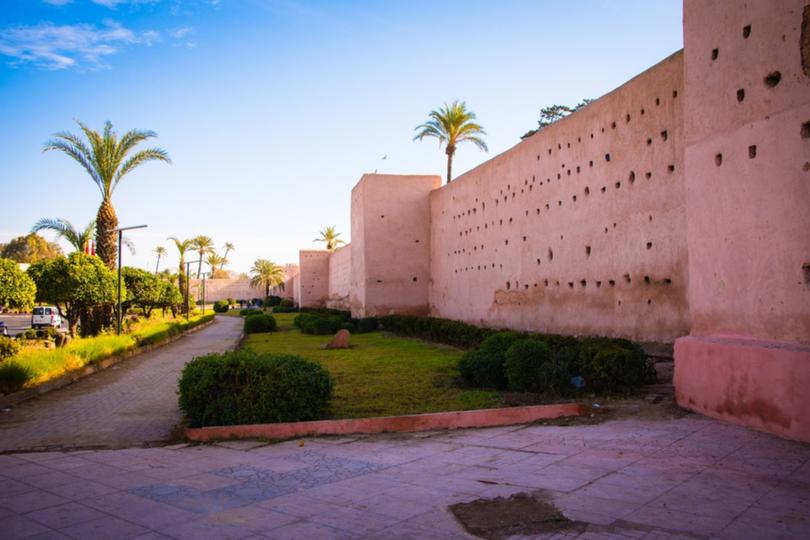It’s the first Christmas since my divorce. I’m spending it alone several thousand miles away from my family.
Not being with family at this time is brutally hard and yet, I’m not sure I would change it.
I’m walking through cobbled streets as a motorbike zips by me, inches from clipping my arm.
The driver waves an apology as I keep walking, sliding past the constant stream of tourists who stop mid-walk o ooh and aah over a courtyard or a museum.
It’s December, and chilly, but the sky is blue and the sun is shining, as it is most days in Marrakech.
Sign up to The Nightly's newsletters.
Get the first look at the digital newspaper, curated daily stories and breaking headlines delivered to your inbox.
By continuing you agree to our Terms and Privacy Policy.I pass stalls cluttered with dark green glazed Tamegroute pottery, with ancient Suzani throws, with rainbow — coloured spices piled high.
They know me here now, and I stop every few feet to shake the hand of a shop holder, ask how they are. I stride on through streets growing narrower and narrower until I reach my own riad, my rented home here in the Moroccan red city.
Tonight, I will eat outside in a friend’s courtyard under the orange trees, lit by flickering lanterns.
On Christmas Day, I’ll see the same friends again.
They are wonderful, welcoming hosts, fellow expats who will ply me with Christmas martinis, perhaps even serve turkey.
This vision of Christmas might feel like an escapist dream to many women groaning over the length of their to-do lists and the weight of family expectations this year.
But it is also the first time I have been a guest at someone else’s Christmas table in 25 years, the first time I have not had my four now-grown-up children with me.
This year, they will be with their father in Wyoming, skiing and opening presents in a winter wonderland.
I will be thousands of miles away, and I’ve never felt quite so alone.

Not being with family at this time is brutally hard – I know the children are missing being able to come back home to Mum – and yet, I’m not sure I would change it.
Morocco is a Muslim country, so there are no signs of Christmas, apart from in the touristy resorts.
Where I live in the medina, the cramped and bustling centre of Marrakech, you won’t find a Christmas wreath anywhere.
It was my decision to leave my 18-year marriage in January this year, to start again on my own at the age of 55.
I had been enormously unhappy, and had withdrawn from the world towards the end of my marriage.
Leaving, while terrifying at times, seemed like the only choice.
Here, I have rediscovered the real Jane, the creative, carefree, big personality.
The Jane who existed before she had to step into the role of wife, of mother.
I have found myself again, and while often joyful, it is also overwhelming and hard.
Christmas has always been my favourite time of the year.
When I was a child, on Christmas Eve my younger brother, usually my arch enemy, would sleep over in my room.
Together, we would wake up and skitter downstairs to grab our presents from under the huge tree, adorned with rainbow-coloured fairy lights and chocolate Santas.
I would lie under the branches, inhaling its pine scent — it smelled like pure magic.
In my early 20s, I would do Christmas for waifs and strays — any friend who didn’t have a place to go.
There was a seven-year suspension of Christmas during my first marriage.
My then husband was Orthodox Jew and refused to celebrate, or allow me to celebrate, Christmas.
I spent seven years trying not to cry over Chinese food on Christmas Eve, and bagels and lox (smoked salmon) at his mother’s kitchen table on Christmas Day.
It’s not that either of those meals weren’t delicious, but they weren’t Christmas.

When we split up, I very quickly fell in love with the landlord of the beach cottage I had rented.
By the time that first Christmas rolled around, we were living together in a bigger house in Connecticut, where every house was adorned with festive lights and it snowed.
I went Christmas-crazy.
There was a tree in the entrance hall, the TV room, the living room, and the family room, each with its own theme and colour scheme.
My children were all under the age of six and in paroxysms of delight at this brand new experience.
I was determined to pass on the magic I remembered from childhood.
On Christmas Eve, we invited a handful of friends over for eggnog and mince pies, and sat listening to Christmas music, stringing popcorn and cranberries together to decorate the tree.
When the guests left, I crept upstairs and spent the next two hours wrapping ridiculous amounts of presents for the children.
Over the years, the handful of people arriving on Christmas Eve turned into a legendary annual party.
I would mention it to everyone we knew, presuming that most people would have multiple invitations,
and might stop by for an hour, but everyone always came and stayed for the whole evening.
Somehow, the tradition for food became farmhouse maple-glazed baby back ribs, and what Americans call popovers, which are essentially Yorkshire puddings (not cooked in the dripping), covered with smoked salmon and a horseradish-and-dill sour cream.
I would start cooking the ribs in the morning, until six hours later the meat would be falling off the bone.
Sometimes there would be eggnog or mulled wine, and a full bar.
Invariably, despite wearing something glittery and fabulous, I would never make it out of the kitchen.
Every year, I would be pulling racks of ribs and popovers out of the oven all evening, a huge apron covering my outfit as sweat dripped the make-up off my face; my beautifully blow-dried hair scraped back in a ponytail.
I only ever got to sit down at the end of the evening, when all but the last few (hanging on for Midnight Mass) had left.
I’d hear other women complain about being Christmas martyrs, with never a moment to themselves — but that was part of the whole experience for me.
It wouldn’t have felt like Christmas if I wasn’t bleary-eyed and exhausted long before the turkey or ham was ready for the oven.
Once the last guests had left, I’d sit down to wrap presents.
I always said it was too much, and next year would be quieter, but I couldn’t help myself.

My childhood home was quiet, and my mother didn’t enjoy people coming over.
When my friends visited I was always terrified they would mess up the cushions, or break something, incurring the wrath of my parents.
I remember so clearly thinking that when I was a grown-up I would have a house where everyone was welcome.
I wanted to give my children the kind of messy, warm childhood I didn’t have.
At times I see my mother in myself — the need for perfection, the love of beauty and a perfect home — but my love of bringing people in has always trumped the need for quiet.
On Christmas morning, we always started with scrambled eggs, bacon and pancakes, followed by each child opening their gifts one by one as a log fire roared.
Every year for almost 20 years, I made Delia Smith’s cranberry and orange relish, followed her instructions to cook the turkey, adding a chestnut, apple and sage stuffing.
We ate around the kitchen table lit by candles on a crisp white tablecloth, with poinsettias down the middle.
Sometimes, if we were very lucky, a flurry of snow would start.
Everything changed, though, during the pandemic.
We sold our beloved family home in 2021 and moved into a tiny beach cottage.
We told everyone we were downsizing, but the truth is we simply couldn’t afford to keep our house.
I was the sole breadwinner and the weight of the financial pressure was huge.
In summer, the beach cottage had a wonderful garden that allowed me to entertain, but in winter, no one could come over.
Gone was the tree with ornaments we had collected throughout the children’s lives because there was no room for a proper tree.
Instead, we had a 2ft-high fake that sat on top of a table.
Gone was the family meal.
The kitchen table was the only table in the house, and it comfortably sat four.
When all the family were home, we were eight. There was no room.
The children visited, but had to sleep on pull-out mattresses and daybeds, sharing rooms, their backpacks and suitcases spilled out to fill every inch of the floor.
In fact, for the two years I lived there, we would borrow the houses of friends who had gone on holiday to have our Christmas meal.
Not being at home for Christmas felt . . . well, wrong.
It was the beach house that destroyed Christmas for me, and possibly helped destroy my marriage.
It robbed me of everything I loved about our life.
I couldn’t do any of it in that little house.
For the two years we lived there, I felt like I lived in a prison.
My marriage finally crumbled last New Year’s Eve.
I can’t blame Christmas, although it was hard for me.
On our first Christmas Day in the cottage, I remember watching the children and my husband opening their gifts before discovering that my husband hadn’t bought anything for me.
I felt mostly sad.
Now, I look back and know I was filled with resentment at my husband for making me live there.
We could have lived in so many wonderful old rambling houses in surrounding, cheaper towns.
Houses where there was room, houses where we could have continued to live a life that felt familiar.
But my husband loved the town in which he was raised and refused to leave, insisting we live in the tiny cottage I had bought years before as a rental investment.
Later, after we split up, all of my friends said the minute they saw the cottage, they knew I wouldn’t be fine; they understood that the cottage would be the end of me.
It ended up being the end of us, which was as devastating and painful as it has been freeing.
The row that finished us off wasn’t particularly seismic; in fact, we had the same row we had been having over and over for years, but this time it proved to be the straw that broke the camel’s back.
I had already planned to visit Marrakech this year, since my next novel features scenes set here.
I’ve always loved the red-walled city, but I never would have dreamed I would be here for Christmas.
My husband had planned to visit me when he could bear to leave his mother, whom he took care of, but after New Year’s Eve we were on very different paths.
It was decided I would go to Marrakech alone while we navigated the breakdown of our marriage.
What I really did was run away — from the pain, and the heartbreak and the overwhelming fear.
At first I buried it by dancing on rooftops and meeting new friends, although you can only run from pain for so long.
I have been in Marrakech, dealing with the grief, ever since and am now settled; my life is quiet, and mostly good.
Grieving for an 18-year relationship is intense, but I would not exchange my freedom.
I love that I finally get to be selfish.
If I want to go to bed early and have a piece of cheese and a cracker for dinner, I can.
No one is telling me I am too loud, or too much. No one is asking what I am spending my money on.
No one is telling me I can’t buy a house or have to live somewhere that makes me unhappy.
Selfish? Perhaps.
But I have been selfless for a very long time, and am loving discovering who I am outside of someone’s wife, someone’s mother.
Do I miss being the materfamilias? Always.
But, much like a grandparent who hands the children back at the end of the day, I long for my children, love when friends come to stay, but also long for the peace that comes when everyone leaves.
In truth, happiness — or peace, which is perhaps a more realistic goal — comes when we have balance.
Christmas, I’m finding, can throw the balance off, with its painful reminders of what we’re missing.
I miss the way London and New York are filled with temporary stands that sell trees and wreaths.
I miss the twinkly seasonal lights.
I desperately miss the prospect of a Christmas Eve party and my children all under my roof.
I will speak to them on Christmas Day, and have made them promise they will come to Marrakech to be with me next year.
I hope to bring my parents and brother and his partner out here too.
While I am renting a riad, too small to fill with guests or do copious amounts of cooking, I am waiting to complete the purchase of a house here, where I hope to be settled by next Christmas.
And it is the perfect place in which to start the annual Christmas Eve party once again.
